“My main goal is to create a strong system.” Interview with the KFF president
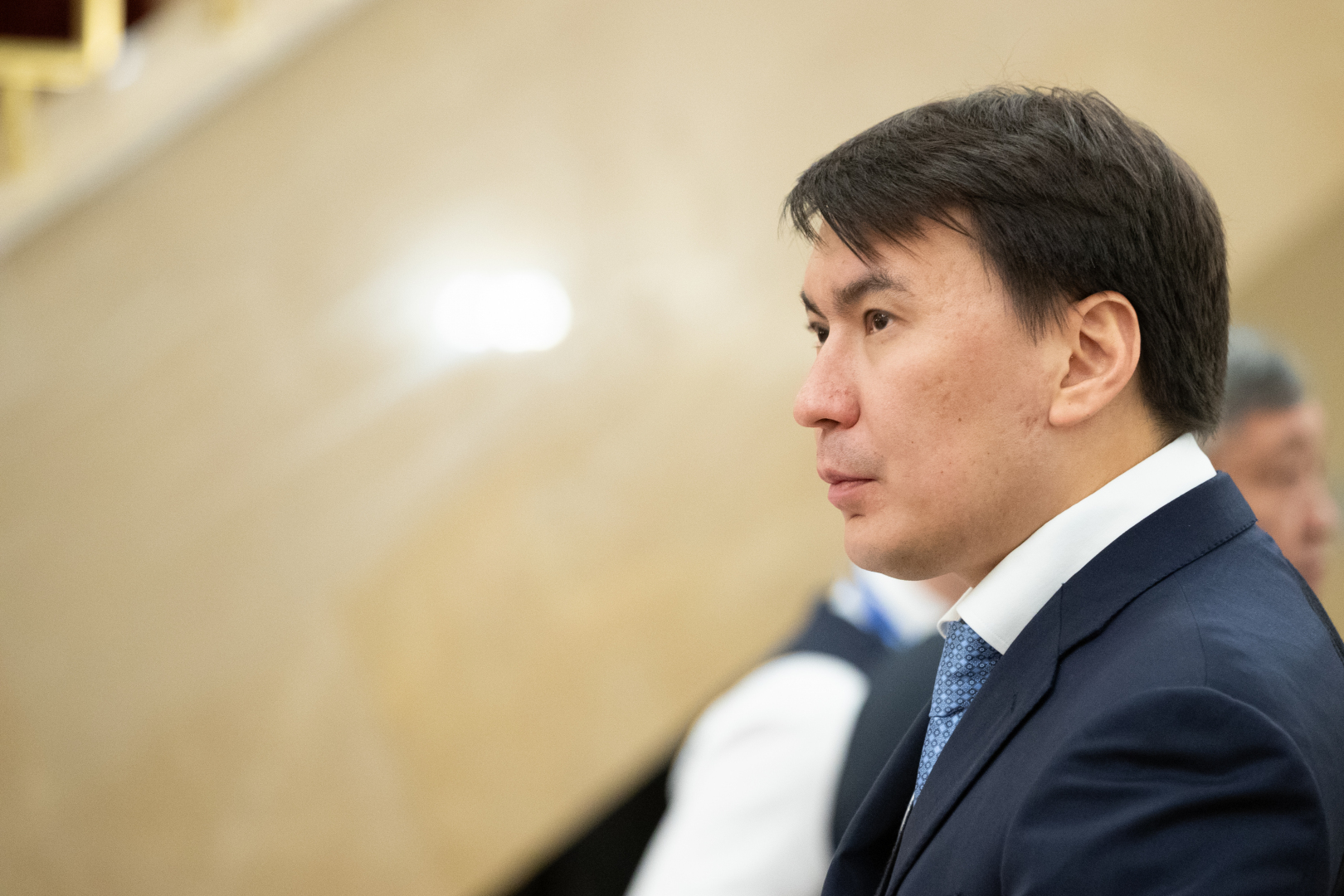
In his interview, the KFF President talked about strategic priorities, the privatization of clubs, partnerships with businesses, national teams, and fair play.
- Marat Talgatovich, you have been heading the federation for six months. What are the main goals and priorities you have set for yourself?
- In his speech at the IV National Kurultay, Kassym-Jomart Kemelevich Tokayev clearly outlined the strategic guidelines in the field of sports: mass participation, health, and education. This vector not only sets goals — it redefines the very approach to sport as a part of state policy. We in the KFF act precisely in this area — with the understanding that football should be not just a spectacular performance, but a part of social progress.
But let's be honest: football in Kazakhstan has not developed for many years and has been systematically destroyed. The Premier League was associated with regular scandals, and the federation was under the influence of disparate groups that pursued their own interests, not the interests of football. Budgets were spent non-transparently and not always for the benefit of fields, children, or development.
There was a lack of the main thing — sustainability. There was no infrastructure, no strategy, no fair and clear selection, and no systematic training of coaches. And perhaps the saddest thing is that nobody really tried to build it.
I say this with special responsibility because I have traveled this path from the inside. In my youth, I played in regional teams and traveled across Kazakhstan to competitions — in parlor cars, without proper food or equipment. We played on enthusiasm with a coach who was both an administrator and a doctor. There was not enough funding, and even if there was, it had not reached its goal but instead went somewhere higher. Often, we did not understand whether we were fighting for the team or just “serving” the program. And that was the main injustice — to children, to coaches, to football.
Today, being at the head of the federation, I don't just remember this; I start with it. We must ensure that the new generation does not have to go through this again. I mean that every child from Taraz, Aktobe, or Semey should have access to the pitch, to the coach, and to equal conditions. I want football to become a system, not a lottery.
That is why we started from the foundation: restoring business confidence, restarting refereeing, reforming leagues, academies, infrastructure, digitalization, and grassroots initiatives — this is not just a list of projects. This is the foundation of a new system.
We are fundamentally moving away from an approach where decisions are made “for someone’s name” — for one coach, for one season, for one manager. We are building a system that will work regardless of personalities — including mine. If we succeed, it will be a real victory for all of Kazakhstani football.
– The president of the country has repeatedly emphasized that clubs must become financially independent. Why is this issue so necessary now?
– Kassym-Jomart Kemelevich Tokayev noted: "Clubs should not rely only on regional budgets; they need to earn money themselves. Global experience shows that without privatization, nothing will change." This is a very clear position for all sports policy.
Today, a significant number of clubs continue to exist on the budgets of the government. This is an unsustainable model. It does not stimulate development, does not create competition, and does not attract a management mindset or marketing. We at the KFF fully support the privatization course and have already begun the transition from concept to action.
We are currently in negotiations with a number of large companies, including international ones. These are not declarative intentions, but substantive discussions: from the parameters of entering the capital to issues of corporate governance and investment obligations. In particular, we are engaged in active dialogue with representatives of large retailers, the construction sector, and investment groups interested in a long-term model for the development of football clubs. We have proposed a specific list of clubs and an order for attracting sponsors and investments. Once the government approves the final list, we at the KFF will immediately begin to implement the President's instructions. We plan to announce the first results by the end of August. Privatization is not a campaign; it is about sustainability, quality, and competitiveness of our football. It is in the private model of clubs that we see the future of Kazakhstan as a football powerhouse.
– To briefly summarize the first six months of your work, how was this stage for you and the federation?
– It was a stage of profound anti-crisis transformation. We started with institutional reform: we put our statutory documents in order, optimized our executive structures, and brought the Premier, First, and Second League championships back under the federation's control. Before that, competitions among professional clubs were independent entities, which prevented us from building a unified football space. Now we have a clear vertical structure: from children's academies to adult football. We eliminated conflicts of interest, reassembled the management team, and strengthened digital and legal control over processes. The federation now works as a team with a common goal: not to imitate development, but to build it systematically. And most importantly, we have managed to restore business confidence. For the first time in a long time, Kazakhstani football has received major investments from national and international companies, without the participation of betting companies as a main resource. As I promised at the beginning of the year, we have abandoned the naming of leagues involving betting brands. This is an important symbolic and practical step—the KFF is moving away from a dependency that has been systemic for many years. Previously, the federation mainly existed on funds from UEFA, the state, and sponsors from the betting sector. Now, for the first time in its history, the KFF has received large-scale funding from systemic businesses. Businesses are attracted not by emotions, but by competence and predictability. Assets flow to where there is confidence in the quality of management, in the systematic approach, and in the fact that investments will lead to results. The fact that private partners are returning to football today is not the achievement of one person, but the result of the collective professional work of a team where everyone realizes their role and responsibility.
In my opinion, this is the main thing that people are beginning to believe in Kazakhstani football as an institution capable not only of talking, but of delivering results. This obliges us to maintain this approach and move forward — from recovery to development, with a focus on infrastructure, training, staff, and sustainable results.
– How are the funds raised from businesses distributed? What is your main priority?
– The priority is infrastructure and systemic stability. In UEFA member countries, there is a recommended indicator: there should be one full-size football pitch for every 10,000 people. In England, this indicator is even higher—one pitch per 1,500 people. Here in Kazakhstan, it is one per 28,000 people. And even then, it is often only for half the season due to climatic and technical restrictions.
If we break down these statistics, it turns out that in terms of football infrastructure, Kazakhstan today is comparable to a country with a population of only about 2 million people, because only that many people in the country actually have the opportunity to train regularly on full-size pitches. This is not just a shortage — it is a systemic limitation that affects everything from mass participation to the level of the national team. That is why infrastructure development is not just one of many issues, but a central task.
We cannot talk about grassroots football if a child in a regional center simply does not have a pitch to play on. Therefore, the first priority is to create good conditions.
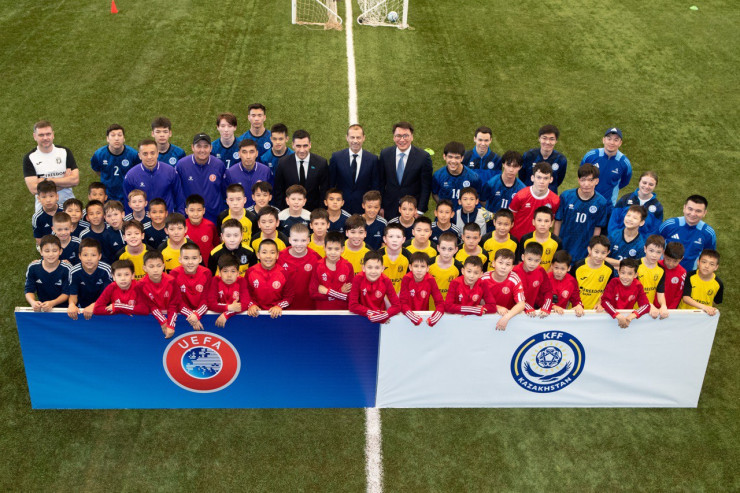
– What is the situation with local infrastructure? What is KFF doing to improve conditions in the regions?
– We take a systematic approach to infrastructure. We currently have three areas on which we are focused at the same time: we are completing the construction of nine full-size pitches under the Alan project as part of the UEFA HatTrick program, we are launching a fundamentally new model under the KFF Arena brand.
As for the Alan project, it is a step in the right direction, but it has a significant drawback: after completion, the pitches are transferred to the ownership of local authorities. This often leads to limited access—children cannot train freely, and in some cases, the pitches are used by Premier League club football centers, which should have created their own infrastructure, as we believe they should.
We are also building Alan pitches more efficiently: if seven fields were built last year, this year, with the same funds, we will build nine. Moreover, with more transparent procedures and access commitments. This shows that even limited resources can be used truly effectively if the approach is systematic.
One of the main questions being asked today is: how can infrastructure be built quickly and across the whole country? The answer, in our opinion, is obvious: do not wait for budget funding, but attract entrepreneurs. It is the private sector that is interested in speed, discipline, efficiency, and results.
In turn, we provide them with everything they need: standard solutions, access to land, financial instruments, and a transparent return on investment model. With KFF Arena, we are building a sustainable sports infrastructure franchise, where each arena is:
- a complete architectural and financial project
- a partnership with the private sector
- a return on investment that includes rent, sales, and marketing
- a standardized IT system with branded design.
This represents a new type of public-private partnership model, where each facility is viewed not as a loss-making endeavor, but as an asset with a clear ROI model and long-term value.
We have drawn on best practices from around the world. For example:
- The Football Foundation in the UK, where the Premier League and the private sector fund football centers
- UrbanSoccer in France – a franchise network of football pitches
- DFB Mini-Pitch in Germany – affordable small pitches in urban and rural areas
All of these initiatives inspired us, but we adapted the model to the realities of Kazakhstan. Our arenas are easy to construct and profitable to operate. Entrepreneurs receive a ready-made turnkey model, including land, financing, branding, and operational support.
This is not just "a field"; it is a new type of infrastructure business with a social mission. We are confident that it is through this model that infrastructure can be rapidly expanded across the country.
The initial locations have already been identified. In the coming months, we will demonstrate what modern infrastructure can look like even in smaller communities.
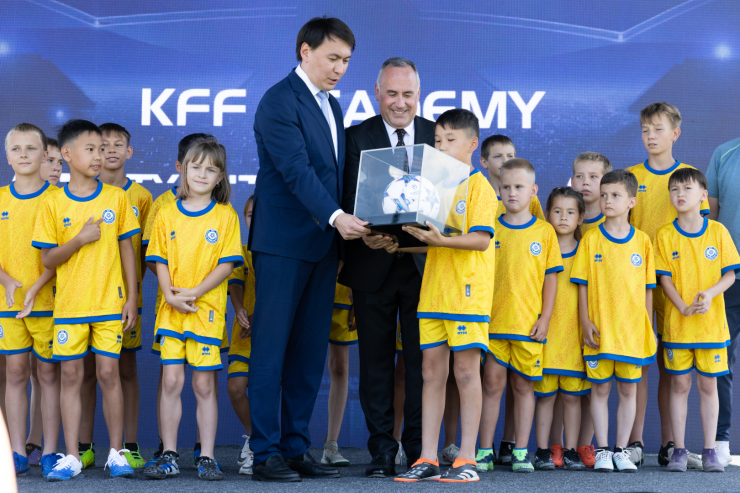
– Academies are also an important issue. What is your approach to this area?
– Academies should not just be beautiful buildings where children live. An academy is about a proper selection system, unified training standards, and standardized assessment.
The construction of the academy in Talgar is a significant step in strengthening the youth football system and creating a sustainable infrastructure for developing the next generation of players. The new academy is intended to serve as a model for a high-quality, collaborative approach to sports development in the country, bringing together the experience and support of all stakeholders.
Next, we plan to build academies in Astana and four regions of Kazakhstan – North, East, South, and West. We are actively working to attract sponsors for these projects.
For the first time in the history of Kazakhstani football, a comprehensive national talent identification system is being developed. To support this initiative, the Federation has established a dedicated talent identification department, is assembling a team of qualified specialists, and is developing standardized evaluation criteria and regional outreach principles. This system will serve as the foundation for selecting players for Kazakhstan’s national academies and teams.
At the same time, we are doing significant work to increase the number of licensed coaches. To date, 1,164 specialists have been trained in Kazakhstan:
-
549 coaches with a UEFA “C” license
-
191 with a UEFA “B” license
-
73 goalkeeper coaches with a UEFA “B Goalkeeper” license
-
29 futsal specialists with a UEFA “B Futsal” license
-
202 with a UEFA “A” license
-
18 with a UEFA “A Elite Youth” license
-
69 with a UEFA “Pro” license
This year, we will launch a regional training program for the UEFA “C” license. In the near future, we plan to open up to six regional coaching centers. By 2030, we aim to double the number of licensed coaches, primarily at the UEFA “C” and “B” levels.
– What can you say about grassroots football and amateur leagues? Are there any changes?
– From April to June, the final matches of the national school league for boys and girls were held in partnership with the National Scientific and Practical Center for Physical Culture. Over 850,000 children from all regions of Kazakhstan participated in the preliminary and final stages.
This year, we restructured the amateur football championship, which is now called the Kazakhstan Amateur League. The tournament spans the entire country and is designed to create a sustainable and structured system for the development of amateur football.
The Kazakhstan Amateur League is envisioned as the foundation of a unified football structure in Kazakhstan—from grassroots to the professional level. It aligns with the KFF’s strategy to develop club infrastructure and enhance football’s social role in the regions.
The winner of the league will be promoted to the Second League and will also take part in the Kazakhstan Cup starting from the 2026 season. In addition, the champion will represent Kazakhstan in the UEFA Regions’ Cup.
Currently, 263 teams are participating in the amateur championship. We are creating an environment where football is more than just the national team—it’s about health, community, and accessibility. Our guiding principle is simple: football should be a right, not a privilege.
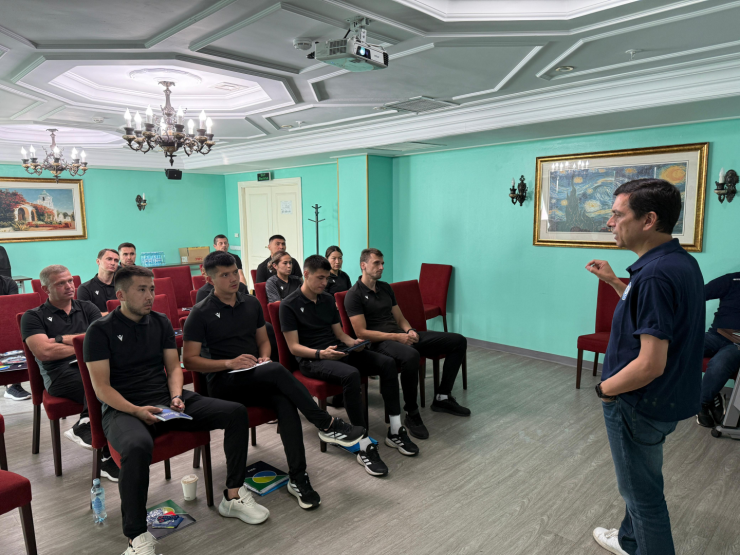
– Refereeing is always a sensitive topic. What steps have you taken to improve the situation?
– When we began working in this area, it quickly became clear that the refereeing system was in deep crisis. There were no modern training standards, no objective evaluation process, and — most importantly — no trust. We started with the fundamentals. We invited Nuno Castro, an experienced international expert, to conduct a full analysis of the system. His findings confirmed what we suspected: the system was operating on inertia, VAR was being used superficially, and there was a complete absence of European-level preparation.
We launched a comprehensive reform. Regular training courses, video analysis sessions, VAR instruction, and a unified exam — covering theory, physical fitness, and video-based decision-making — are now mandatory. We're also implementing an international standard where only team captains are allowed to speak to the referee on the pitch.
In addition, we plan to bring in foreign referees for selected matches — as a form of external oversight and experience exchange. At the same time, Kazakhstani referees will have the opportunity to train abroad to gain practical experience and further their professional growth.
But reform is not just about education and courses. We've addressed key structural issues. Referees’ salaries have been doubled, and timely, regular payments have been restored. Previously, months-long delays created financial pressure and dependence. Now, referees are paid on time and understand that their work is valued and protected.
We’ve also eliminated conflicts of interest. Previously, clubs covered referees’ travel, accommodation, and meals, which could compromise neutrality. These costs are now fully covered by the Federation. A referee must not be financially dependent on the club whose match they are officiating. This is a basic principle of fairness and integrity.
Alongside this support, we've also raised expectations. We made it clear: we are committed to training, developing, and motivating referees — but the standards will be high. Mistakes are part of football. But systemic incompetence or resistance to change are no longer acceptable.
A recent case illustrates this approach clearly. After the match between Turan and Qyzyljar, where serious officiating errors occurred, both the head referee and the VAR official were suspended for the remainder of the season by Nuno Castro, Head of the Refereeing and Inspection Department. We also launched an internal investigation. This sends a clear message: any attempts to manipulate or improperly influence the competition will be dealt with immediately.
There’s no doubt that the system has long been under pressure. Referees were used to receiving calls and subtle instructions. When that stopped, many were initially confused – unsure how to operate without directives. But most have adapted. They now see that no one is interfering and that decisions are their own responsibility. We are giving them space and time to grow. But the Turan–Qyzyljar match showed that some individuals are still trying to cling to outdated practices. That’s why our response was immediate. Those unwilling to change will not remain in the system.
We don’t hide the problems — we address them. Under Nuno Castro’s leadership, a new system of training and evaluation is being developed. It is already in place and will only become more professional over time. We are creating a safe, transparent environment — free of fear, and focused on quality. Referees should know: if they are honest, competent, and committed to growth, the Federation will support them. The level of responsibility in Kazakhstani football has entered a new era.
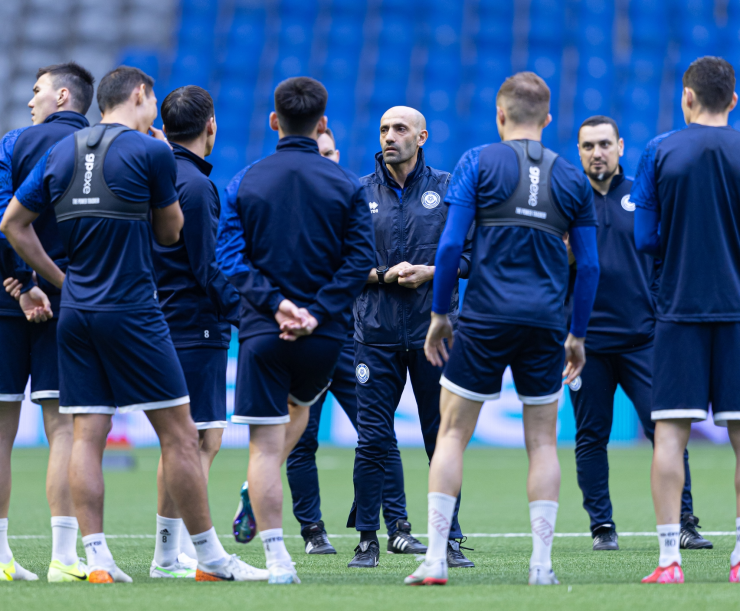
– You often mention the word “system” in your answers. However, for most people, football is primarily associated with the national team. How would you assess the national team today? What is changing in your approach to its development?
– That’s true — for the general public, football is first and foremost about the national team. But the national team is the top of the pyramid. If we want long-term success, we must build a solid foundation: infrastructure, academies, and modern training methods. That’s exactly what we are focusing on right now.
Our goals are ambitious. We want to see Kazakhstan qualify for the European Championship and the World Cup — not as a one-time event, but through a sustainable, long-term development system. We are just beginning this journey, and for the first time in many years, we’re doing it without slogans or “manual control.”
We have strengthened our management team. David Loria, a former national team player and UEFA MIP graduate with top-level experience and clear strategic thinking, is now the General Secretary. He oversees internal discipline, international communications, and operational processes.
Gennady Skurtul, an experienced UEFA specialist, has been appointed Technical Director of the Federation. He is responsible for youth, women’s, and grassroots football, as well as coordinating the national teams’ development system. One of his key roles is to support the elite youth football program, including projects based at the KFF Academy.
Ruslan Baltiev, a legend of Kazakh football and former national team captain, now heads the National Teams Department. He understands from experience what it means to represent the country — the training challenges, coordination with clubs, and logistical issues. He is systematically reorganizing the department, improving infrastructure, managing training schedules, nutrition, travel, and recovery protocols.
As for head coach Ali Aliyev, he is a local specialist who understands the specific characteristics of Kazakh football. We are carefully monitoring and evaluating his work. His contract is effective and much more reasonable in terms of cost compared to previous appointments like Cherchesov. He works closely with the National Teams Department and the KFF Technical Center. We analyze his performance without external pressure or interference.
The national team is currently undergoing a rejuvenation process. In February and March, the coaching staff held training camps with potential new players. In total, 30 players participated, showing strong motivation and potential.
Under the new coaching staff, four official matches have already been played, giving opportunities to several new names in the Kazakhstan squad: Mukhammedzhan Seisen, Nauryzbek Zharov, Aliyar Mukhammed, Dastan Satpaev, Galymzhan Kenzhebek, Adilbek Zhumakhanov, and Dauren Zhumat.
We are also redefining our overall approach to the national team. In the past, it was often used as a platform for administrative and financial interests rather than as a subject of systematic development. Today, the situation is different. We are not imitating progress — we are building it. No PR stunts — just responsibility and structure. Only through this kind of foundation can we expect real, lasting results.
Our mission is to build a new generation of players who can lead Kazakhstan to the World Cup and European Championships.
Take Uzbekistan as an example. In 2017, they launched a major football reform — building infrastructure and establishing a clear development pathway. After eight years of focused effort, they qualified for the World Cup for the first time. That is no coincidence, but the result of strategic planning and systemic change. They prioritized the national teams over individual clubs — and achieved results. We sincerely congratulate them and believe Kazakhstan can go even further.
Of course, UEFA competitions are more demanding. We consciously chose to join UEFA in 2002 so that our players could compete against stronger opposition. UEFA is the most competitive football confederation in the world and offers unparalleled development tools. We are proud to be part of UEFA. The path through Europe is challenging — but it is the right one.
– In your opinion, when will Kazakhstan be able to qualify for the World Cup?
– This is one of the most common — and most difficult — questions. Qualifying for the World Cup is not a matter of a lucky campaign or changing a head coach. It is the outcome of long-term, systematic work at every level of football.
Our current focus is on building infrastructure, launching and supporting youth academies, training qualified coaches, developing grassroots football, and raising the overall level of domestic competition.
Desire and motivation alone are not enough to qualify for the World Cup. It takes years of consistent work, guided by clear methodology, deep analysis, and a functioning club ecosystem that supports youth development and elite performance.
That’s why we avoid making bold promises or short-term declarations. Our goal is to build a system that produces sustainable results. If we stay on this path — step by step — Kazakhstan will reach that level. And when we do, it won’t be a surprise. It will be the result of smart, professional, and consistent work.
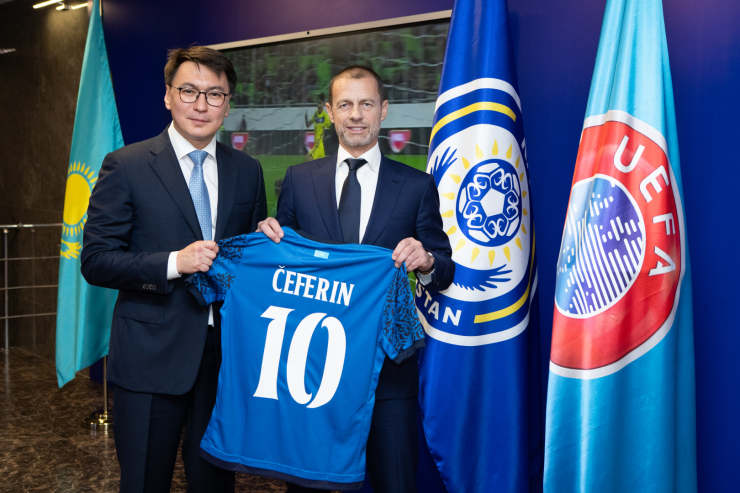
– Speaking of international cooperation, how is your work with FIFA and UEFA structured? Are there any specific agreements, plans, or upcoming events involving their participation?
– On April 25, on the occasion of Kazakhstan Football Day, UEFA President Aleksander Čeferin paid an official visit to the capital of Kazakhstan.
During his visit, the UEFA President met with the President of the Republic of Kazakhstan, Kassym-Jomart Tokayev. In their conversation, the Head of State expressed his deep appreciation for UEFA’s support and attention to the development of football in our country.
The Kazakhstan Football Federation (KFF) actively cooperates with both FIFA and UEFA. These organizations support national associations in a wide range of areas, and Kazakhstan is no exception. Through their involvement, various programs — from grassroots development to national team initiatives — are being funded. We are fully engaged in these projects and feel genuine support from the international football community.
Looking ahead, we plan to submit bids to host major UEFA events such as the UEFA Conference League Final, the UEFA Super Cup, and the European Under-17 or Under-19 Championship.
We have also submitted an application to the FIFA Forward program to receive infrastructure grants for the development of one of our regional academies. In addition, we are working on stadium certification and participation in the FIFA Football Arena support program.
Naturally, all of this requires infrastructure that meets international standards. That is why KFF is currently coordinating closely with the Ministry of Tourism and Sports, local authorities, and stadium owners to ensure that new facilities are built to comply with UEFA and FIFA requirements.
– Everything you’re saying sounds ambitious. But how can the public be sure that these plans won’t remain just words? Will people have access to information about spending, projects, and outcomes?
– This is a fundamental issue for us. We understand that trust must be earned through action. Today, KFF operates on a model of full transparency and accountability: all raised funds are earmarked and tied to specific projects. Sponsorship funds cannot be reallocated without justification and oversight.
We’ve already started introducing the use of digital tenge for key areas of expenditure — including procurement, infrastructure support, and sponsorship agreements. This isn’t just a technology test — we’re integrating it into our administrative culture. Step by step, we’re expanding the share of such transactions and linking them with our internal accounting system. This enables precise tracking of financial flows and helps minimize risks of inefficiency or lack of transparency. For us, this is not an image project — it’s a management tool.
By the end of the year, we will publish a comprehensive financial report, prepared by one of the Big Four accounting firms. It will be public, detailed, and updated annually. Kazakhstani football has long needed an open, transparent budget, and we are committed to providing one.
– If you had to summarize everything you’re currently building, how would you describe your core management mission? What matters most to you personally?
– My main task is to build a system — not rely on emotions, campaigns, or manual control. We need a sustainable, repeatable modelbased on infrastructure, personnel, methodology, oversight, digitalization, and trust. It’s time to stop building showcases — and start building foundations.